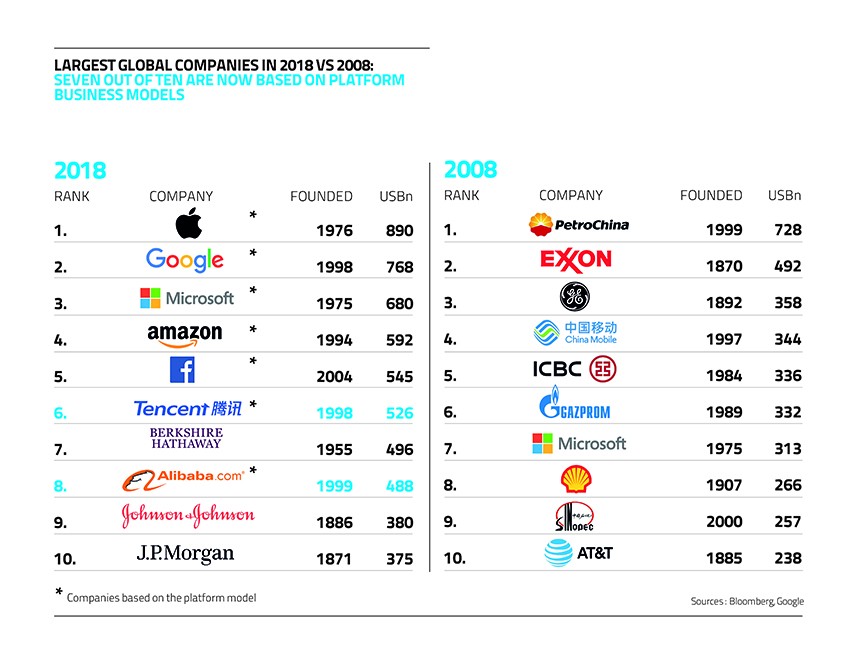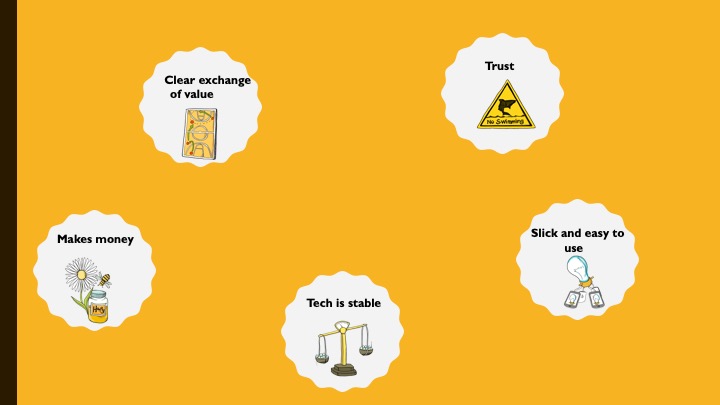Platform businesses are some of the world’s most valuable firms and the first trillion-dollar companies. They are now considered as our generations’ most insurgent business model.
We’ve been at the beginning of something new since companies like Amazon, Uber and Airbnb showed up and raised the stakes. There is a new wave of platform-based disruptive companies that are not just changing the industry, but are bringing about societal change – how we interact with one another, how we live, where we live and even how we make money. They are bringing new opportunities, threats and problems to solve -– for society, for the tax man and for regulators every day e.g. Uber and TfL in London.
When it comes to the business of Platforms, we now see two types of economies.
- The conventional bricks and mortar economy, requiring ownership of assets and the sales of these or service provision via these. Think retail and Consumer Goods.
- Then there’s the second – the platform economy. I’ll define this as a technology led infrastructure created for a specific business purpose, bringing individuals and organisations together to innovate, interact, and provide services in ways not otherwise possible. Platforms create economic value far beyond what we see in conventional companies.
The most interesting thing for me is how platforms and digital innovation are part and parcel. The infrastructure of platform business models has at the heart of it a value exchange between producers and consumers. It’s open to allow regulated exchange and communication and it’s scalable as it does not bear the cost of developing services internally.
Examples of Platform businesses:

Note that in 2018 seven out of ten of the world’s largest global companies were based on platform business models. What’s missing from this list are two of the biggest players in the sharing economy and platform model Uber and Airbnb, I’ll use these two as examples shortly.
I’ll go onto explain what makes a successful platform business and what Digital platform businesses need to start doing to remain competitive and relevant. Before I do so I’ll use a few businesses as examples to explain a series of terminology.
- The brand vs partners vs consumers
- Digital platform
To explain these terminologies let’s use Airbnb.
Airbnb is a community-based online platform for listing and renting local homes. It connects hosts and travellers and facilitates the process of renting without owning any rooms itself. Moreover it cultivates a sharing-economy by allowing property owners to rent out private places. Controversial in some places and becoming more and more regulated with the launch of their IPO in December 2020.
Airbnb is the brand and business that owns the digital platform. They pretty much serve as the middle man who not only brokers the exchange, but builds, maintains and provides access to their powerful ‘digital platform‘ for their partners who are the hosts / hotel / home owners to list their places on. They also provide this ‘digital platform’ for the consumer who are the holiday makers and travellers who book the homes. They then take a commission or service fee from both the partners and the consumers for using their digital platform to broker the exchange of service.
What makes a successful Platform Business?

There are five things that binds together successful platform businesses, they can be defined as:
- Clear value exchange: There needs to be an underlying technology that facilitates others to build their own business. This is the value exchange. Since platforms are essentially digital marketplaces that allow transactions between partners and the owners, it makes sense for there to be a clear value exchange to keep partners and consumers sweet. Airbnb makes money, the hosts who list their homes on airbnb make money and the consumer gets access to a unique home they otherwise would never get access to like this one.
2. Consumer trust: Without trust the platform fails. Uber is a great example. In 2019, Uber faced a number of challenges with London TfL. According to this article from the Business Insider — TfL decided to strip away Uber’s London license on two separate occasions after identifying “several breaches” that it said “placed passengers and their safety at risk. More than 14,000 unauthorized people had uploaded fake identities onto approved Uber drivers’ accounts and were picking up passengers using vehicles not registered with the account.” Uber’s platform allows drivers to be connected directly with consumers. If the consumer cannot trust the driver is who they say they are – there’s a problem with the platforms model. Uber had to rectify this immediately to ensure trust and the ongoing success of its business model. Another example is Google’s ‘google my business’ feature. This model is all about trust as it allows consumers to review businesses, take pictures of the businesses location and update key information directly such as opening hours. This way you can be assured the business actually exists!
3. Slick and easy to use: This is all about ongoing development. The most successful platform businesses like Pinterest, Uber and Airbnb build platforms that are almost straight out of the box. Intuitive to use by following set patterns and UX standards – some that are universal and some that are brand aligned. In addition to the UX and usability, the features they bring out are created using Design Thinking processes. They also combine data and analytics with constant customer testing and research for their benefit. Essentially there is heavy investment in constantly evolving the digital platform, constantly innovating it and testing it to make sure it is usable, user friendly and accessible.
4. Scalable and stable tech: Because of the nature of the platform business, the technology stack and infrastructure needs to be scalable, stable and superior. Platform businesses have fuelled the growth of cloud technology implementations over the last 10 years for this reason. Amazon have capitalised on this extremely well with AWS. Ocado a UK based retailer have also caught onto this having been innovating their OSP (Ocado Smart Platforms) which is to be used for operating online grocery businesses. Cloud enabled technology not only improves stability but allows for scalability. The most successful platforms ought to be scalable without needing a big 2 year digital transformation project to get it moved from A to B – they simply will not be able to afford the loss of time otherwise. Platform businesses thrive on building for unmet needs – since unmet needs are being discovered all the time, a scalable tech stack is a must. For this reason you see some of the biggest investments go into their digital solutions, I mean they can afford to right? Since they typically do not hold stock or inventory themselves – their business is their platform. Even Amazon don’t tend to hold stock! They own the warehouse for third party companies to send the inventory and stocks to. Amazon staff then package and ship, whilst the platform processes payments and provides a place for sellers to list their items. As consumers have gotten so heavily reliant on these companies, hosting millions of concurrent users is the norm; therefore downtime is big revenue loss for them and their partners.
5. Makes money: Digital Platforms are clear trailblazers when it comes to revenue generation and wealth creation. The owners of these companies are some of the richest people in the world – have you heard of a billionaire called Jeff Bezos – think he owns this company called Amazon? Yea – that’s a platform business. There’s no mistake that a growing majority of digital platform businesses are now the largest businesses and most recognised brands in the world. The value exchange needs to generate revenue for all parties for the digital platform to be successful – that is the business itself (usually through commission on sales e.g. Amazon Fulfilment. The partners – who provide a service need to generate income and revenue from providing a service via the platform. If this value exchange isn’t integrated with revenue – it’s a failure and it won’t work as a digital platform business.
SHOULD I BE BUILDING A DIGITAL PLATFORM BUSINESS?
Does that mean you should go off and start building platforms now? NOOOOOO Don’t do it just yet! I know a few consulting firms and banks that have gone ahead to do just that in recent times. Unfortunately a lot of them have not taken off extremely well. Why? Because they failed to blend the secret sauce to success. This is there needs to be an unmet business need and a unique value exchange that can bring in revenues for the owner/producer and their partners. Without this my friend, you’ll fail at the first hurdle and will just have a very expensive digital platform that nobody wants to or can use. There I said it.
What does the future hold for Platform businesses?
The future is bright for platform businesses in my view. We’ll start to see hyper growth of this type of business model. However as these companies are usually Disruptors themselves, to thrive, they need to strategically innovate to ensure they are not disrupted in the next 5, 10, 15 years. I’m sure there are a lot of factors needed to ensure continued survival in the years to come. Here are some of my predictions for what the future holds for them:
- We’ll continue to see diversification of their businesses as they seek new revenue streams. This will in turn create an interdependent ecosystem for their brands. We are already seeing this clearly with Google and Apple. Apple now offer credit cards and Apple Pay. Airbnb now offer experiences as well as long term stays – a fantastic market move driven by the effects of Covid-19 on the travel industry, demonstrating the continuous need for scalability of their digital platforms and constant innovation led by analytics and understanding of customer behaviour and needs.
- Gaming will set a new course for digital platforms. For those of you who have young children, teenagers or are keen gamers yourselves, there’s no way you would have missed out on Roblox. So take Roblox for example. Roblox is a global platform where you create and share in a 3D virtual world. This world allows you to build new worlds, make new virtual creations and virtual games. If you choose to, you can also sell your virtual creations to others by trading Robux (in game currency, needs real money to buy it mind you!) Basically, it’s the 80’s and 90’s version of “hey you can come and play in my house today, but you’ve got to pay me before I let you in.” I’m excited to see the revenue potential here and will be watching with a lot of interest.
- We’ll see a reframing of Design Thinking, or new innovation models built on the precipice of Design thinking. To survive as a disruptor, you need to constantly innovate and evolve. Doing this successfully needs many things, one being a way to understand unmet and unarticulated needs of customers. The Design thinking methodology shows us a way to do this is by engaging customers through a series of prototypes to learn, test, and refine innovative concepts prior to launch. I’d like to think the plethora of data generated by existing platform businesses, alongside such methodologies will help us to formulate or build on innovation models in years to come.
I’d love to know what other predictions you have for Digital Platforms in the next 1-3 years and what other factors are needed to make digital platform businesses successful. Drop your thoughts in the comments below!


Great article. Informative & value adding throughout
LikeLike